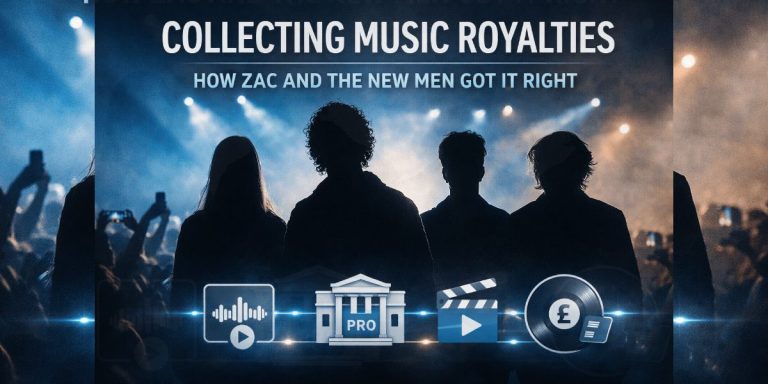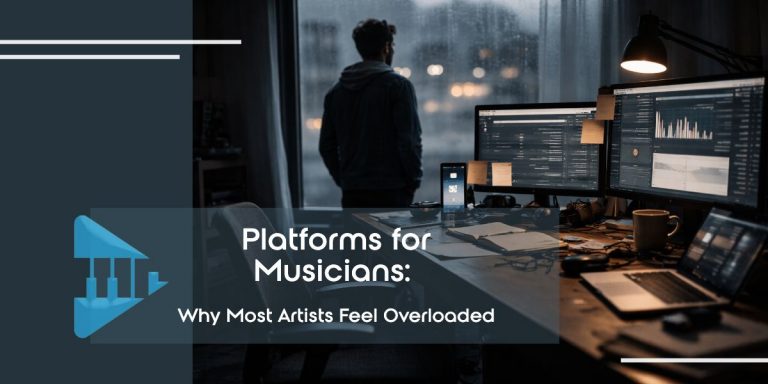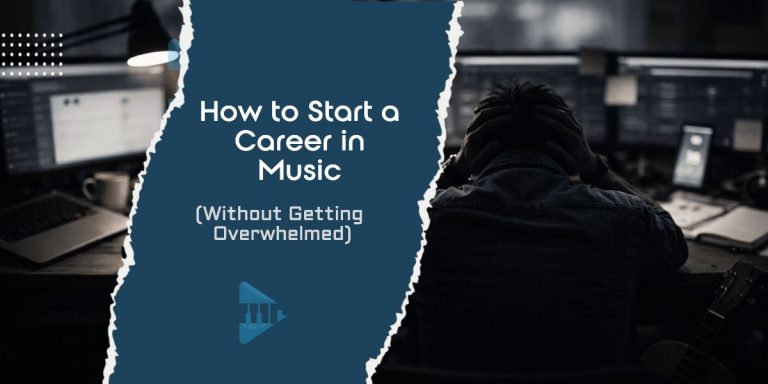Table of Contents
ToggleMaster Royalties vs. Publishing: What They Are — and How to Own Both
You Made the Song. Why Don’t You Own It?
You hit record. Caught lightning in a vocal take. Labored over the mix, bled into the lyrics. That track? It’s yours — until it isn’t.
Too many artists find out after the release that they don’t actually own what they created. Not the recording. Not the song. And not the royalties flowing from either.
Welcome to the messy, misunderstood split between master royalties vs. publishing royalties.
One ties directly to the recording. The other connects to the songwriting. They’re both income streams. And they’re both easy to lose — if you don’t know how the game works.
This post is here to untangle the difference, show you where the money goes, and give you the steps to own what’s yours. Because in 2025, ignorance is expensive — and ownership is everything.
TL;DR (Key Takeaway): Master royalties come from the recording. Publishing royalties come from the songwriting. Own both to earn fully.
Quick Glossary: Know These Terms First
- Master recording meaning: It’s the official, finished version of a track — the one that gets streamed, sold, and synced.
- What are masters in the music industry? These are the original sound recordings. Whoever owns the master owns the right to license and profit from that recording.
- Publishing rights: These connect to the composition — lyrics, melody, and structure — and determine who earns from songwriting royalties.
Publishing vs Masters: What’s the Difference?

Think of a song as two things:
- The Recording — the final audio file you hear
- The Composition — the lyrics and melody underneath
Each has its own copyright, its own royalties, and its own rules.
| Master Rights | Publishing Rights | |
| What it is | The actual recorded version of a song | The song’s composition: lyrics, melody, chords |
| Who owns it | Usually the record label — unless you self-release | Songwriters and publishers |
| How you earn | From streams, downloads, syncs, licensing deals | From radio play, cover songs, mechanicals, syncs |
| What to watch | Label contracts, producer splits, licensing terms | Co-writing splits, PRO registration, admin deals |
Master vs. Publishing Royalties: Where the Money Comes From
This is where artists get tripped up — and robbed.
Master royalties come from the recording — the audio file itself. Streaming platforms pay these royalties to distributors, who then pay master owners. If you signed a deal without retaining ownership, those royalties may bypass you completely.
Publishing royalties flow from the composition — the song as an intellectual property. This includes:
- Performance royalties: Money from live shows or radio play — collected by your PRO.
- Digital Mechanicals and Mechanical royalties: Money from downloads, CDs, or vinyl — paid per copy sold or streamed.
(Find out the difference between digital and physical mechanicals here)

- Sync royalties: You earn these when your song — lyrics and melody — appears in film, ads, video games, or TV shows.
Let’s say Netflix licenses your track. They’ll issue two separate payments — one for the master (your recording) and another for the publishing (your songwriting). If you don’t own both, you’re only getting half.
Bottom line: Owning both sides of the track — recording and composition — is the only way to claim the full value of your music. If you don’t, someone else is cashing the checks.

How to Own Your Masters and Publishing
Self-release your music.
Not signed yet? Stay that way (for now). You’ll automatically control your master when you distribute through DistroKid, TuneCore, etc.
Register your compositions.
Melody Rights helps you register your compositions with a PRO (like ASCAP or BMI) and set up publishing administration — so you collect royalties globally and don’t leave money on the table.
Read every contract.
Before you hit the studio, lock in your terms. Who owns the final mix? What happens to the rights if you’re collaborating?
Use a split sheet to divide publishing rights clearly. To clarify master ownership, use a master ownership agreement template. The agreement spells out exactly who owns the recording and how the rights are divided.
Melody Rights offers tools to document ownership clearly — from splits to master agreements.
Watch for red flags.
- Label contracts: Scan closely for ownership clauses — labels often bury them in the fine print.
- Producer splits: Some producers try to claim master rights. Nail it down early.
- Licensing terms: Watch for dangerous phrases like “in perpetuity.” That means forever — and not in a good way.
Protect your publishing too.
- Co-writing splits: Lock these in early — especially when you’re writing with multiple collaborators. Use a split sheet.
- PRO registration: If you skip this, you skip the money. Register your songs with ASCAP, BMI, or SESAC.
- Admin deals: Read the fine print. Some publishing admin agreements quietly limit your control or lock you in for too long.
Already distributing through DistroKid, TuneCore, or even CD Baby? Great — that means you likely own your masters. But what about your publishing rights? That’s where Melody Rights comes in. We handle the registration, royalty tracking, and admin that those platforms leave up to you.
Artists That Own Their Masters
Russ stayed independent and kept 100% of his masters. According to HipHopDX, Russ owns his catalog and earns six figures weekly through the power of full ownership.
Taylor Swift re-recorded her catalog to regain control after her original masters were sold without her consent. As explained in Time Magazine, her ‘Taylor’s Version’ albums represent a groundbreaking shift in artist rights, allowing her to reclaim full control of her work.
Chance the Rapper also owns his masters. He has consistently spoken about staying independent. In a 2018 interview on the Joe Budden Podcast, he said, “I’m independent because I own all my recording rights and publishing rights and distribution, everything,” as reported by HipHopCrownNation.
They didn’t just make music. They made ownership a part of their legacy.
Who Owns the Master Recording of a Song?

Short answer? Not always the artist.
In most traditional deals, the record label owns the master recording — not the person who created it. That means every stream, download, and sync deal routes money and control to the label first.
But that’s changing.
Today, more independent artists are self-releasing through platforms like DistroKid or TuneCore. If you upload the track yourself and don’t sign away rights, you own the master.
Here’s where it gets tricky:
- Recording studios and producers may try to claim partial ownership unless there’s a written agreement.
- “Work for hire” clauses in contracts can quietly strip you of master rights.
- Licensing deals sometimes grant “temporary” ownership that becomes permanent if you’re not careful. Here’s how they work.
Ask this upfront: Who owns the final audio file being distributed? If it’s not you, then you’re working for someone else’s catalog.
Artists Who Own Their Masters — and How They Did It
“Own your shit.” — Russ
Taylor Swift refused to accept the sale of her original catalog without her consent. She re-recorded her entire catalog as ‘Taylor’s Version,’ setting a bold precedent for artists reclaiming control.
Russ wrote, produced, and distributed everything himself — keeping full control from day one. He talks openly about the financial freedom of owning your masters, proving how independence can pay off.
Chance the Rapper used his independence as leverage to own everything he dropped. His strategy proved that you can be mainstream, chart-topping, and still own your masters — if you build leverage before you sign.
They didn’t just make music. They made ownership a part of their legacy.
How Melody Rights Simplifies Royalty Collection
Owning your rights is step one. Collecting every cent is step two. Melody Rights helps you:
- Track what you own — across masters, publishing, and metadata
- Register your works — with PROs, MLC, and more
- Get paid properly — no missing royalties, no unclaimed income
- Spot ownership risks — before they become financial leaks
- Build your catalog value — with clean, verifiable rights data
We don’t just help you understand the system — we help you master your music rights, income, and future.
Where Your Music Can Go — and How Melody Rights Helps It Get There
Imagine your music placed in films, TV, games, streaming shows, or across sync marketplaces — everywhere listeners discover sound. Melody Rights makes that vision real through a platform that gives artists clear control and visibility over music placements.
Whether you’re targeting sync placements or exploring licensing opportunities, Melody Rights is ready to walk you through the full potential of your ownership.
Explore Sync Tools with Melody Rights → https://melodyrights.com/how-it-works
Take Back What’s Yours
If you made it, you should own it. And if you don’t yet, there’s still time to take it back.
Start by understanding the two sides of your song: the recording and the composition. From there, protect, register, and collect.
Melody Rights is here to walk you through every step.
Ready to own your masters and publishing? Let’s make sure your music pays you first.
Start Your Ownership Journey with Melody Rights → https://melodyrights.com/contact#
Frequently Asked Questions
What is the difference between masters and publishing rights?
Masters refer to the actual recording of a song. Publishing refers to the composition (lyrics and melody). Different rights, different royalties.
What is the difference between royalties and publishing rights?
Royalties are the money you earn. Publishing rights determine who gets the songwriting-related royalties. Whoever holds the master rights gets paid for the recording.
What are masters in the music industry?
They’re payments for the use of the recording — like streams, sync licenses, and digital sales.
What are the 4 types of royalties in music?
Mechanical, performance, sync, and master royalties.
Do I own 100% publishing rights?
Only if you wrote the song and haven’t signed away rights to a publisher or collaborator. Use a split sheet to clarify.
Who owns the master rights to a song?
Usually the label, unless the artist self-releases or negotiates ownership. Always check your contract.
How does Melody Rights help with ownership?
We handle PRO registration, metadata cleanup, rights tracking, and royalty collection — so you capture every dollar and keep full control. We also help you find where to sell your music — from sync placements to licensing platforms.



